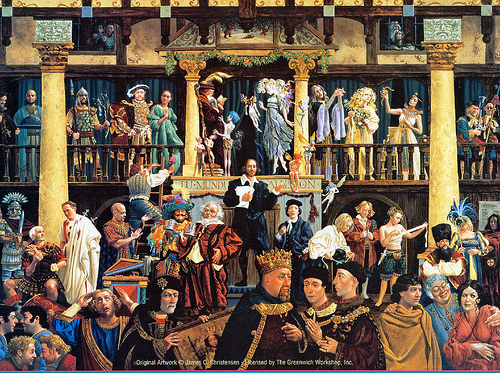“The Restoration left Puritanism to lick its self-inflicted wounds. Puritans who had believed themselves to be fighting for God’s cause blamed each other for destroying it. Instead of converting and purifying the world, the hope which the civil war had brought them, they now had to concentrate, as in the 1630s, on their survival in it.” – pg. 160, The English Civil Wars
I can definitely say that it was this blurb from Worden’s book that influenced my second paper in the class. Although we talked about the many “causes” of the civil wars and the many interpretations to it, I always found the role of Puritans – and ideology – during this time quite fascinating. They were always the loudest critics of pretty much everything that made England, England. Once the civil wars started and the interregnum took hold, you could find Puritanism somewhere in the middle.
In class, we debated quite a bit as to whether Worden was arguing that the main factor of the Civil Wars was religion or was it more than that. I don’t think we ever truly came to a conclusion, but I think this little part in the Restoration section shows that he believes it is a significant aspect when looking at the Civil Wars. For those Puritan members of Parliament, Puritan laymen scattered throughout England, Puritan (and independent) soldiers of the newly founded Army, the civil wars was about much more than just a bad king who was abusing his – and Parliament’s – rights. It was also about the fear of where Christianity would go in England, and how Puritans could influence a wide array with the “right” way of practicing Christianity. Purifying the world they were living in was more important than ever before because of the new-found power and voice they had at this time. Of course they ended up losing a lot of the traction after the restoration in 1660, but it cannot be denied that some of their wayward thoughts continued to influence English politics even after the civil wars. Although their main focus was to just survive after Charles II came back from his “travels”, their actions before had set a precedent for others.
I have to say after this class I really see and understand Puritans in a whole different light. Even though protestantism was always depicted as the “good guys” in England, I would have to say that I definitely felt like Puritans were big antagonizers during this time period. They seemed much more radical, outspoken, and problematic than I would have ever initially thought. I mean it still boggles my mind that they opposed Arminianism so vehemently when Arminianism had roots in Calvinism! They are just a very interesting group to look at and now I know that their role in Early Modern England is much more significant that I would have ever thought.


One of the interesting things about the politics of puritanism is that there were many sympathizers with the cause in the House of Lords and the Elizabethan Court. Walsingham, for example (sorry, should have offered a trigger warning for Molehill-related PTSD) was an advocate for the moderate puritans as Secretary of State, and there were many in that faction. (Burghley too, if I recall.)
One result of this is seen in the split in the Civil War itself – when the idealistic aristocrats split from the revolution before the second half, it really is almost a second revolution. (Some even describe it as such.) From our limited reading on the subject, I’d be surprised if the revolution could have got off the ground at all without the support of the puritans in the Lords, and the fact that they couldn’t stay with it until the end is tremendously interesting. Remember the final document that we read from Charles – there are three forces in British politics, not two.